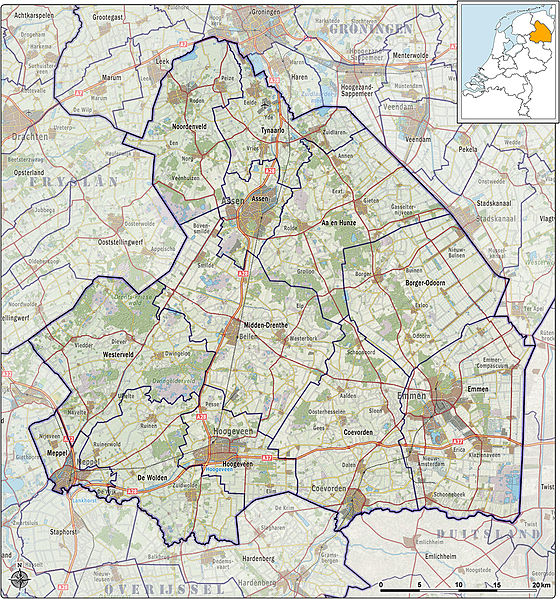Drenthe
- Details
- Category: 12 provinces
Drenthe is a province of the Netherlands, located in the north-east of the country. The capital city is Assen. It is bordered by Overijssel to the south, Friesland to the west, Groningen to the north, and Germany (districts of Emsland and Bentheim) to the east.
History
Drenthe, unlike many other parts of the Netherlands, has been a sparsely populated rural area since medieval times. Except for some industry in Assen and Emmen, the lands in Drenthe are mainly used for farming.
 Drenthe has been populated by people since prehistory. Artifacts from the Wolstonian Stage (150.000 years ago) are among the oldest found in the Netherlands. In fact, it was one of the most densely populated areas of the Netherlands until the Bronze Age. Most tangible evidence of this are the dolmens (hunebedden) built around 3500 BC, 53 of the 54 dolmens in the Netherlands can be found in Drenthe, concentrated in the northeast of the province.
Drenthe has been populated by people since prehistory. Artifacts from the Wolstonian Stage (150.000 years ago) are among the oldest found in the Netherlands. In fact, it was one of the most densely populated areas of the Netherlands until the Bronze Age. Most tangible evidence of this are the dolmens (hunebedden) built around 3500 BC, 53 of the 54 dolmens in the Netherlands can be found in Drenthe, concentrated in the northeast of the province.
Drenthe was first mentioned in a document from the year 820, it was called Pago Treanth (district Drenthe). In archives from "Het Utrechts Archief", from 1024 to 1025, the "county Drenthe" is mentioned, when Emperor Henry II gave it to Bishop Adalbold II of Utrecht.
After long being subject to the Utrecht diocese, Bishop Henry of Wittelsbach in 1528 ceded Drenthe to Emperor Charles V of Habsburg, who incorporated it into the Habsburg Netherlands. When the Republic of the Seven United Provinces was declared in 1581, Drenthe became part of it, although it did not gain provincial status until January 1, 1796 due to its poverty.
Shortly before the outbreak of the Second World War, the Dutch government built a camp near the town of Hooghalen to accommodate German (Jewish) refugees. Ironically, during the Second World War, the German occupiers used the camp (which they named KZ Westerbork) as a "Durchgangslager" (transit camp). Many Dutch Jews, Sinti, Roma, resistance combatants and political adversaries were imprisoned before being transferred to concentration and extermination camps in Germany and Poland. Anne Frank was deported on the last train leaving the Westerbork transit camp, on 3 September 1944.
The name of this region is said to stem from *thrija-hantja "three lands".
Municipalities
Due to reorganisations in the 1990s, the number of municipalities in Drenthe has been reduced to twelve. Most municipalities therefore now consist of several towns and villages.
Aa en Hunze
Assen
Borger-Odoorn
Coevorden
De Wolden
Emmen
Hoogeveen
Meppel
Midden-Drenthe
Noordenveld
Tynaarlo
Westerveld
Latest articles
- Accommodatie Eurovisie Songfestival 2020 - Rotterdam
- Vermeer - famous Dutch painter from Delft
- Delft - Oude Kerk - Old Church
- Delft
- Enkhuizen - Havenweg - streetview - Google Maps
- Alkmaar - cheese market - Waagplein - streetview - Google Maps
- Hoorn - city center - Roode Steen - streetview - Google Maps
- Veere - Townhall - streetview - Google Maps
- Middelburg - Townhall - streetview - Google Maps
- Vlissingen - Smallekade - streetview - Google Maps
- Zierikzee- streetview - Google Maps
- Oosterschelde- streetview - Google Maps
- Haringvlietdam - Haringvlietsluis - streetview - Google Maps
- Hollands Diep - streetview - Google Maps
- Moerdijk bridges - streetview - Google Maps
- Harlingen - streetview - Google Maps
- Stavoren - streetview
- Dokkum - streetview
- Giethoorn - streetview
- Claire Morgan The Sound of Silence - Noord Brabants Museum
Visitors for Visitholland
We have 102 guests and no members online

